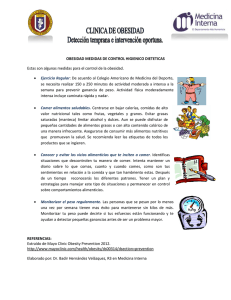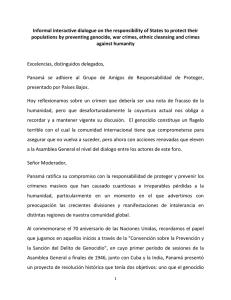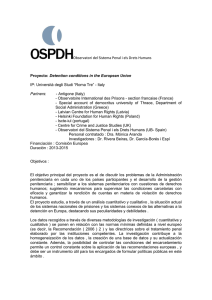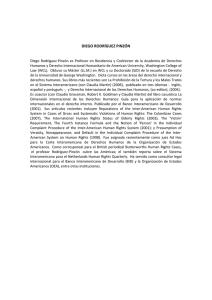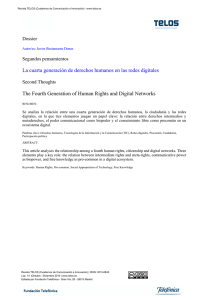ASAMBLEA GENERAL Diálogo interactivo sobre la
Anuncio
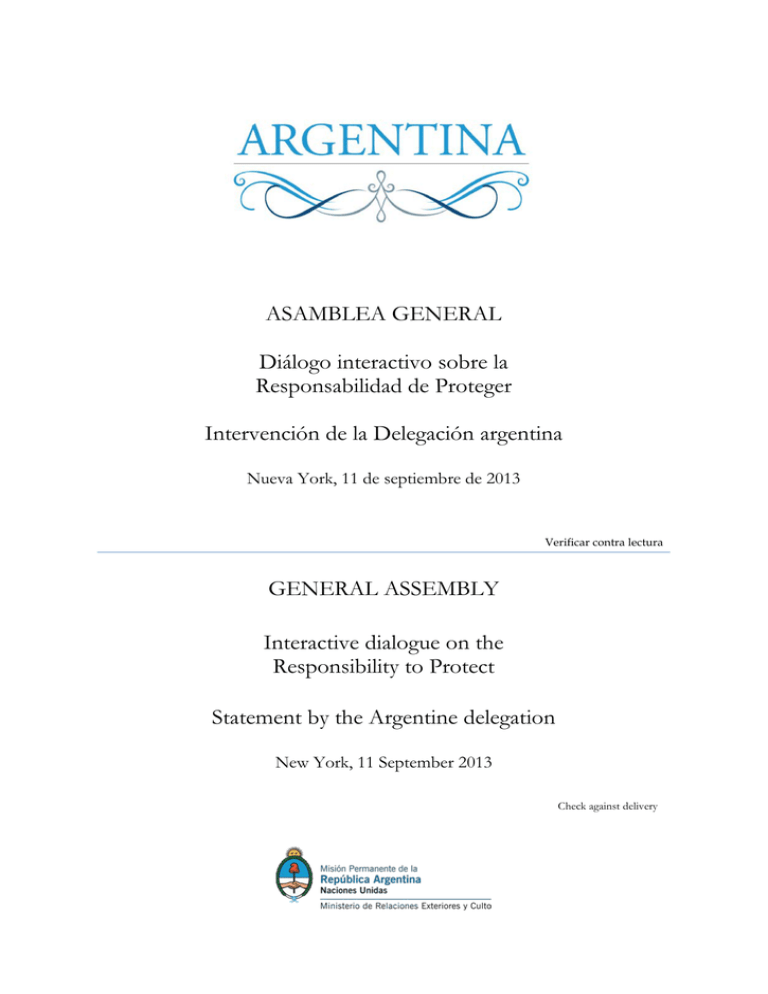
ASAMBLEA GENERAL Diálogo interactivo sobre la Responsabilidad de Proteger Intervención de la Delegación argentina Nueva York, 11 de septiembre de 2013 Verificar contra lectura GENERAL ASSEMBLY Interactive dialogue on the Responsibility to Protect Statement by the Argentine delegation New York, 11 September 2013 Check against delivery Señor Asesor Especial para la Prevención del Genocidio: Quisiera agradecer al Presidente de la Asamblea General por haber convocado a este diálogo interactivo sobre la Responsabilidad de Proteger y al Secretario General por su informe. Asimismo, deseo reconocer su cooperación permanente y dar la bienvenida a la Sra. Jennifer Walsh. Señor moderador: Dado que la Representante Permanente de la Argentina participó como panelista esta mañana, esta intervención tocará brevemente aspectos complementarios. El Documento Final de la Cumbre de 2005 recoge un compromiso que en realidad no es una norma nueva, sino un concepto político que conjuga todas las obligaciones internacionales de los Estados conforme el derecho internacional de los derechos humanos, el derecho internacional humanitario y el derecho de los refugiados. Desde sus inicios, la Argentina apoya el concepto de la responsabilidad de proteger. Señor moderador: La Embajadora Perceval ya hizo referencia, en el panel, a la reafirmación de la responsabilidad primordial del Estado en mi país debido a las graves violaciones de los derechos humanos cometidas durante la dictadura militar entre 1976-83 y a las medidas nacionales adoptadas para investigar, enjuiciar y punir a los responsables, y para mantener la memoria, necesaria para asegurar la no repetición. Esas medidas fueron complementadas con acciones en el plano internacional, a las que ella hizo referencia. Permítame entonces mencionar los siguientes aspectos: En 2012, se lanzó, en colaboración con el Instituto Auschwitz y con el apoyo de la Oficina del Asesor Especial del Secretario General para la Prevención del Genocidio, la Red Latinoamericana para la Prevención del Genocidio y Atrocidades Masivas. La Red ya se encuentra funcionando con la colaboración de 18 países latinoamericanos. Por otra parte, los Foros Regionales para la prevención del genocidio son un emprendimiento que mi país lleva adelante con Suiza y Tanzania desde 2008. Recientemente, a esta iniciativa se sumó Camboya. 2 La Acción Global contra los crímenes atroces (Global Action against Mass Atrocity Crimes) ya fue mencionada por otros países. La Acción Global fue lanzada este año bajo los auspicios de Tanzania y Suiza, y participaron también la Argentina, Australia, Costa Rica y Dinamarca, así como la Oficina Conjunta de Prevención del Genocidio y Responsabilidad de Proteger y ONGs. El objetivo es servir de red de cooperación internacional bajo la cual las redes de prevención del genocidio y responsabilidad de proteger ya existentes puedan cooperar en la prevención. Señor moderador: Un elemento crucial para la prevención es que los Estados acepten las obligaciones dimanantes de los instrumentos relativos a la protección de los derechos humanos, al derecho humanitario y al derecho de los refugiados, y que los integren a sus políticas internas. Asimismo, quisiera destacar la importancia de ratificar el Estatuto de Roma sobre la Corte Penal Internacional, ya que la contribución de la CPI a la lucha contra la impunidad es innegable. La Argentina coincide en que así como es un desafío que la prevención de atrocidades se incorpore a las políticas nacionales en materia de derechos humanos, es importante lograr en las Naciones Unidas un trabajo más integrado con, por ejemplo, estamentos de la Secretaría, el Consejo de Derechos Humanos y de los mecanismos de relatores y expertos independientes, los órganos de tratados de Derechos Humanos y las Comisiones de Investigación. Señor moderador: Creemos que es importante en este momento recordar que desde el inicio del concepto de responsabilidad de proteger, fueron las medidas coercitivas, en particular el uso de fuerza, el que -aún concebido como ultima ratio- generara incomodidad y desconfianza. Esa desconfianza aumentó luego de la acción armada autorizada por el Consejo de Seguridad en Libia, y el propio Secretario General reconoce las preocupaciones generadas en su Informe del año 2012. La acción de las Naciones Unidas no puede seguir objetivos políticos ajenos a la organización ni ocasionar más víctimas entre los civiles que se busca proteger, porque ello afectaría la credibilidad del concepto responsabilidad de 3 proteger y, en definitiva, la legitimidad de la acción colectiva de las Naciones Unidas. Hoy, diversas delegaciones hicieron referencia a la situación en Siria, y escuchamos algunas intervenciones exhortando a la acción armada. La Argentina condena el uso de armas químicas con la misma contundencia que condena todas demás violaciones graves de los derechos humanos, ocurran donde ocurran, cualquiera sea la causa esgrimida y quienquiera que sea el responsable, y cree firmemente en la necesidad de la rendición de cuentas por tales crímenes. Apoya la investigación del Secretario General sobre el posible uso de armas químicas en Siria, y espera sus resultados objetivos e imparciales. La Argentina, desde que ingresó al Consejo de Seguridad, y encontrando una crisis que llevaba ya dos años, siempre sostuvo la necesidad de lograr una solución política. Ataques aéreos sólo ocasionarán, como en Libia, más muertes y, además, una acción armada sin autorización del Consejo de Seguridad sería, simplemente, una acción violatoria de la Carta de las Naciones Unidas. Señor moderador: La Argentina cree que la forma de evitar el Pilar III, que tanto preocupa a numerosos países, es profundizar los esfuerzos y la cooperación en materia de prevención. Apoyamos las recomendaciones del Informe del Secretario General y en particular la propuesta de abordar ahora el Pilar II. Finalmente, quisiera agradecer una vez más a la Oficina Conjunta por su trabajo cooperativo con los Estados Miembros. Muchas gracias. 4 Mr. Special Adviser on the Prevention of Genocide, I would like to thank the President of the General Assembly for having convened this interactive dialogue on the Responsibility to Protect (RtoP), and the Secretary General for his Report. Also, I would like to recognize your constant cooperation and welcome Mrs. Jennifer Walsh. Mr. Moderator, As the Permanent Representative of Argentina intervened as a panelist this morning, this statement will briefly touch upon some complementary aspects. The Final Outcome of the 2005 Summit embodies a commitment that constitutes no new norm, but is a political concept summarizing all international obligations of States under international human rights law, international humanitarian law and refugee law. Since the beginning, Argentina supports the concept of RtoP. Mr. Moderator, Ambassador Perceval, at the panel, made reference to the reaffirmation of the primary responsibility of the State that took place in Argentina due to the serious violations of human rights committed during the military dictatorship between 1976-83 and to the national measures adopted to investigate, prosecute and punish those responsible, and to maintain memory of those events, something necessary to ensure non recurrence. Those measures were complemented with actions in the international arena, to which she referred. I would then like to touch upon the following aspects: The Latin-American Network for the Prevention of Genocide and Mass Atrocities was launched in 2012 with the cooperation of the Auschwitz Institute and with the support of the Office of the Special Advisor for the Prevention of Genocide. The Network is already functioning, with the collaboration of 18 Latin-American countries. Also, the Regional Fora for the Prevention of Genocide are an undertaking initiated in 2008 together with Switzerland and Tanzania. Recently, Cambodia joined this initiative. The Global Action against Mass Atrocity Crimes has been mentioned by other countries. The Global Action was launched this year under the auspices 5 of Tanzania and Switzerland, and Argentina participated together with Australia, Costa Rica and Denmark, as well as the Joint Office for the Prevention of Genocide and RtoP and NGOs. The purpose is to have a network of international cooperation under which existing networks on the prevention of genocide and RtoP could channel cooperation on prevention. Mr. Moderator, A crucial element of prevention is the acceptance by States of the obligations arising from instruments on the protection of human rights, on humanitarian law and on refugee law. Also, I would like to underscore the importance of ratifying the Rome Statute on the International Criminal Court, as the contribution of the ICC to the fight against impunity is undeniable. Argentina coincides in the challenge it is to incorporate prevention of atrocities into national human rights policies, but at the same time it is important to achieve more integration at the UN with, for example, other parts of the Secretariat, the Human Rights Council and the rapporteurs and independent experts mechanisms, human rights treaties organs and factfinding commissions. Mr. Moderator, We believe it is important now to remember that since the inception of the RtoP concept, coercive measures –in particular the use of force- were those that, even when conceived as ultima ratio, generated discomfort and distrust. That distrust was increased by the armed action authorized by the Security Council with respect to Libya, and the Secretary General himself recognized the concerns raised in his 2012 Report. Action by the United Nations cannot either pursue political objectives alien to the Organization, or cause more victims among the civilians seeking to protect, as it would affect the credibility of the RtoP concept and, in the end, the legitimacy of collective action by the UN. Today, several delegations made reference to the situation in Syria, and we heard some interventions calling for armed action. Argentina condemns the use of chemical weapons as firmly at it condemns all other serious violations of human rights, occurring anywhere in the world, under any excuse, and whomever is responsible, and firmly believes in the 6 need to hold those responsible to account. Argentina supports the investigation by the Secretary General on the possible use of chemical weapons in Syria, and awaits its objective and impartial results. Argentina, since it joined the Security Council and having found a crisis that had endured for two years, has always sustained the need to achieve a political solution. Aerial attacks would only cause, as in Libya, more deaths. Also, an armed action without Security Council authorization would be, simply, a violation of the UN Charter. Mr. Moderator, Argentina believes that the way to avoid Pillar III –which raised the concern of many countries- is to strengthen our efforts and cooperation on prevention. We support the recommendations of the Report of the Secretary General, in particular his proposal to address Pillar II next. Finally, I would like to thank once more the Joint Office for its cooperative work with Member States. Thank you 7
